Latest News
Afghanistan in the shadow of the US Presidential Election
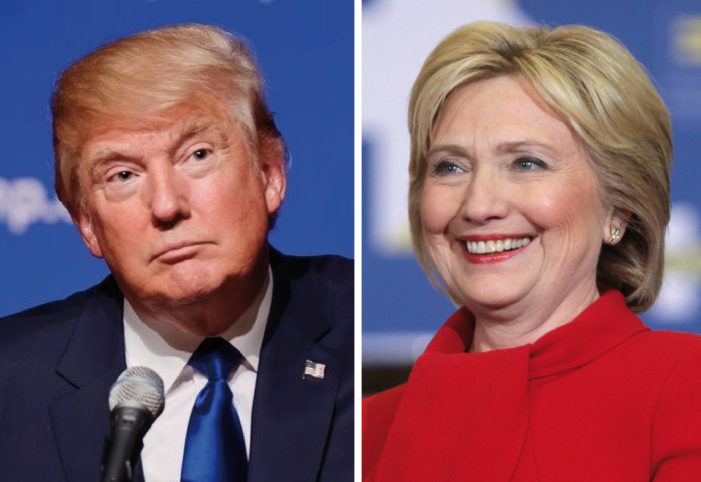
The first US presidential debate took place at Hofstra University, Hempstead, NY September 26, 2016 and the next two major debates are scheduled to take place on 9th and 19th of October, 2016 with first one at Washington University in St. Louis, St. Louis, MO and the last one at University of Nevada, Las Vegas, Las Vegas, NV. Meanwhile there will be only one vice presidential debate between Mike Pence from the republican and Tim Kaine from the democrat party which will be held at Longwood University, Farmville, VA.
By Timor Nawabi
Washington D.C. October 2, 2016
As US is entering in to its sixteenth year of its longest war in Afghanistan with no ending point in sight; the two leading US presidential candidates did not show any big interest during their first historic presidential debate to talk about their longest military war in Afghanistan and their future plans for the betterment of the situation in that region.
Meanwhile the leaders of the National Unity Government of Afghanistan are preparing to leave for another important conference to Brussels. The Brussels conference happens right after the Warsaw Summit in July 2016 during which the world leaders reaffirmed their mutual commitment to ensure long-term security and stability in Afghanistan. On the other side the National Unity Government of Afghanistan signed a historic peace accord with Hezb-i-Islami; a deal that the NUG hopes will lead to peace and prosperity in the country and more agreements with other fighters in the future.
The US Green and Libertarian Parties
Apart from the US Democratic and Republican parties there are two other major parties in US that both the media and the people have rarely talked about them and are not hearing from them so often. These parties are “The Green Party” led by an American physician, activist and politician Jill Ellen Stein and the “Libertarian Party” chaired by American businessman, author and politician Gary Earl Johnson. These two candidates have also expressed their unwillingness in fight against terrorism in Afghanistan.
The Green Party nominee Jill Stein has always been against the war in Afghanistan and in Jan 2012 she had considered the Afghan and Iraq war illegal. In Dec 2011 she had said that US does not need to be in Afghanistan because there’s no military solution to that war and prior to that on Sep 2010 she called the Afghan and Iraq war a military misadventure and had asked the Obama administration to end the war. Very recently on May 2016 she had said that war on terror has cost $6T and a million lives.
The Libertarian nominee Gary Earl does not seem to be so happy with the wars in Iraq and Afghanistan too and in May 2011 he had asked to eliminate ineffective interventions in Iraq and Afghanistan. On the same month he’d also said that there’s no need to have an afghan timetable; US needs to start its withdrawal tomorrow and finish it in a few months. Back in May 2011 he was quoted that the afghan war was initially warranted but not for 10 years. Then on August 2011 he considered Afghanistan, Iraq, Iran and Libya as a no military threat zone for the US but interestingly; in Aug 2012 he’d said that the afghan nation-building project will fail and US needs to withdraw its forces from there immediately.
Afghanistan from the viewpoints of Clinton and Trump
Speaking of the two leading US presidential nominees; during the first presidential debate it was expected that the two candidates may have something in their pockets about Afghanistan and their longest involvement in a battle after the Vietnam War but only the Democratic Party nominee Hillary Clinton did briefly touch on the NATO’s commitment towards US in fight against terrorism in Afghanistan something which she praised but again no specific word on Afghanistan and their long term commitment towards the ANDSF ( Afghan National Defense Security Forces) and GIRoA. The national unity government and its people still expect both candidates; no matter how they interpret the war in Afghanistan with considering the current presence of ISIS in most part of the country specially in eastern Afghanistan where we also share the border with Pakistan in Torkham area; to talk about it during their upcoming debate on 9th of October in state of Missouri.
Hilary Clinton was one of those democrat candidates who always tried to support the war against terrorism in Afghanistan whereas she was the one who voted YES back in Oct 2003 on $86 billion bill for military operations in Iraq and Afghanistan and then in Jan 2008 she said that she would have never diverted attention from Afghanistan and in Jun 2012 Clinton-Gates combo won push for Afghan surge. She also expressed her support from the afghan women back in Jan 2013 by saying that the Afghan women are better off, but we must prevent reversal.
But when you go to Clinton’s website and scroll down in to the “national security” section you would only see one sentence which says “our commitment to Afghanistan’s democracy and security.” When she gave a major foreign policy speech about four months ago, she didn’t mention Afghanistan at all. Other things she’s said recently don’t seem to be so helpful or at some point give hope to the people of Afghanistan. “If we’ve learned anything from 15 years of war in Iraq and Afghanistan, it’s that local people and nations have to secure their own communities. We can help them, and we should, but we cannot substitute for them. But we can and should support local and regional ground forces in carrying out this mission” she said last November at the Council on Foreign Relations which can be translated as that afghans need to stand on their own feet and US cannot continue supporting them for the rest of their lives.
On the other hand the well-known Republican nominee Donald Trump had no interest to talk about not only Afghanistan but also about NATO as US’s strongest ally in fight against terrorism in the region, he had even asked that NATO has to be obsoleted. He mentioned that during a major show he was asked that what he thought of NATO and his response was that NATO and its 28 member countries aren’t paying their fair share while at the same time he was urging that NATO has to pay US for defending it and more importantly according to Trump NATO has to be obsoleted because they are not focusing on terror. This republican nominee had nothing to say about the fight against terror in Afghanistan and the price that both the American taxpayers and Afghan people have paid during the past 16 years but back in Oct 2015 he had considered Afghanistan war a mess and interestingly he had urged that US troops need to stay there and then on Nov 2015 he said that it’s a blunder to announce the withdrawal timetable from Afghanistan.
It is worth mentioning that back in 2013 he tweeted, “Let’s get out of Afghanistan. Our troops are being killed by the Afghanis we train and we waste billions there. Nonsense! Rebuild the USA.” During the primary campaign he said going to Afghanistan in the first place was a mistake, and then denied having said it at all. “I never said it. Afghanistan is a different kettle. Afghanistan is next to Pakistan, it’s an entry in. You have to be careful with the nuclear. It’s all about the nuclear weapons. By the way, without the nukes, it’s a whole different ballgame,” he said in October 2015. “Do I love anything about it? No. I think it’s important, number one, that we keep a presence there and ideally a presence of pretty much what they’re talking about — 5,000 soldiers.” So such antithesis statements of Trump gives us an idea that again the National Unity Government should not rely more on Trump as they did on former president George Bush and currently on president Obama because Donald Trump is totally a different personality and sees things completely the other way around. Let’s hope for the best!
The Cost of US war in Afghanistan
Afghanistan is a country where the cost of war has been unexpectedly as high that no one could ever predict it when the US military operation first started in 2001. $714.8 billion has been allocated for the war in Afghanistan since 2001, including $35.1 billion in fiscal year 2015. At the same time $6.2 billion has been allocated to fight the Islamic State (also known as ISIS or ISIL), including $5.4 billion in fiscal year 2015.
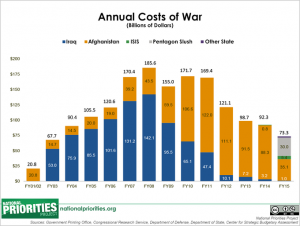 This number does not end here because US war in Iraq has been an expensive war for the US military where they spent $817.8 billion since 2003 including an estimated $1 billion in fiscal year 2015.
This number does not end here because US war in Iraq has been an expensive war for the US military where they spent $817.8 billion since 2003 including an estimated $1 billion in fiscal year 2015.
The US war against terrorism in Afghanistan did not only cost money but more importantly it took lives of thousands of innocent civilians, soldiers from every nation that were involved in that war and contributed to peace and stability in that region and the Afghan National Defense Security Forces have paid the highest price in this war than any other nation that were involved in fight against terrorism in Afghanistan.
According to Resolute Support Commander General Nicholson more than 900 Afghan security forces had been killed in month of July only. On 28 July, 2016 Gen. John Nicholson had said that the number of Afghan Security Forces killed so far this year (2016) is about 20 percent higher than during the same period last year. In all of 2015, there were 20,000 casualties among Afghan Security Forces, he added.
Alongside the afghan causalities 3520 American/Coalition forces have been killed since 2001 of which 2384 of them are Americans, 455 of them are Brits and another 681 from different nations.
During the war in Afghanistan (2001–2014), over 26,000 civilian deaths due to war-related violence have been documented; 29,900 civilians have been wounded. Over 91,000 Afghans, including civilians, soldiers and militants, are recorded to have been killed in the conflict, and the numbers who have died through indirect causes related to the war may include an additional 360,000 people.
The total civilian casualty figure recorded by the UN between 1 January 2009 and 30 June 2016 has risen to 63,934, including 22,941 deaths and 40,993 injured.
According to UNAMA report This year’s casualties include 1,509 children (388 dead and 1,121 injured) – a figure the UN Human Rights Chief described as “alarming and shameful,” particularly as it represents the highest numbers of children killed or wounded in a six-month period since counting began in 2009.
There are 9,800 U.S. troops in Afghanistan. In July, after assessing the country’s deteriorating security conditions, President Barack Obama announced that 8,400 U.S. troops would remain into 2017, a far larger number than the small contingent of counter-terrorism forces that was originally set to remain post-2016.
Brussels Conference on Afghanistan (4-5 October)
As President Ghani and CEO Abdullah are making their preparations to leave for the Brussels’ conference; more than 70 countries and 20 international organizations have showed up their readiness to participate in one of the most vital meetings that the afghan delegation can take huge advantage of it and can mark it another stepping stone towards peace, stability and long lasting financial development in the country.
On October 4-5 the European Union and the Afghan government will co-host the conference where the international community will provide a platform for the government of Afghanistan to set out its vision and track record on reform and root out corruption within their administration. For the international community that played a vital role in financing and supporting the afghan government during the past years, it will be another opportunity to signal sustained political and financial support to Afghan peace, state-building and development in different areas.
The conference is expected to focus on three levels that are very important for the afghan government to present itself in a way so that the international community gets more interested on a sustained political and financial support to the afghan government.
The first topic that they’re going to touch on would be the joint international and Afghan efforts to increase the effectiveness of sustained international support and funding, on the basis of a new Afghan national development framework where the second topic would shed more light on reform efforts, including economic reform, rule of law, improved public finance management and anti-corruption which is one of things that the afghan government has always failed to cope with and has repeatedly been criticized by the international community during the past 16 years of its administration after the collapse of the Taliban regime in 2001.
The final issue that they’ll focus on would be the regional efforts to support a political process towards peace and cross-border economic cooperation which again the afghan government needs to focus more on and it’s considered vital for the economic development in the country.
National Unity Government’s Peace Accord with Hezb-i-Islami
The Brussels conference comes in a time where few days ago president Ghani finally formalized a peace treaty with Hezb-i-Islami led by Gulbuddin Hekmatyar after months of negotiations with the party’s representatives in Afghanistan. President Ghani and Hekmatyar signed the agreement via a video link and live broadcast by the state TV into the presidential palace where the majority of other Jehadi leaders from different parties had participated as well.
If we go back to 1990s the history of such agreements has already repeated itself. following the ouster of Afghan President Dr. Najibullah in 1992, Hekmatyar and other warlords began a civil war in Afghanistan, which led to the deaths of around 50,000 civilians in Kabul alone. In the meantime, Hekmatyar was promoted to becoming Prime Minister of Afghanistan from June 1993 to June 1994 and again briefly from Sep 1996 to August 1997 but he fled again and started fighting against former Mujahidin government led by president Rabbani. In May 2013 at least 16 people lost lives in a suicide attack in Shah Shaheed area of Kabul which was later claimed by Hizb-e-Islami under the leadership of Mr. Hekmatyar. As we see none of these agreements and temporary positions within the Afghan government for Mr. Hekmatyar has worked out but it is being said that the last agreement is the first peace treaty the Afghan government has completed since the war with the Taliban began in 2001 and hope it lasts longer than before.
Please open the link below to read about NATO’s mission and its presence in Afghanistan from 2001-2016:
http://www.nato.int/cps/en/natohq/topics_8189.htm
 About the author: Mohammad Timor Nawabi is the former Senior Media Analyst and Public Diplomacy Adviser to NATO Ambassador in Afghanistan. He has served with NATO in different capacities from Aug-2004 to July-2016. He can be reached on Twitter at @TemorN and Facebook https://www.facebook.
About the author: Mohammad Timor Nawabi is the former Senior Media Analyst and Public Diplomacy Adviser to NATO Ambassador in Afghanistan. He has served with NATO in different capacities from Aug-2004 to July-2016. He can be reached on Twitter at @TemorN and Facebook https://www.facebook.
View expressed in this article are of the author’s own and do not necessarily reflect Ariana News editorial policy.

Latest News
Save the Children sends plane with 92 tonnes of medicines to Afghanistan

A plane carrying 92 tonnes of vital medicines has arrived in Afghanistan to treat about 675,000 people, including children, with life-threatening but treatable illnesses after an increase in respiratory infections and measles this year, Save the Children said on Tuesday.
The consignment – the largest delivered by Save the Children in a year – will provide lifesaving treatment for nearly 400,000 children afflicted by endemic childhood illnesses such as respiratory tract infections, pneumonia, acute watery diarrhoea, and skin diseases, the organization said in a statement.
Since the beginning of 2024, more than 1,000 children under the age of 5 have died after contracting pneumonia, comprising 88% of all deaths from respiratory infection.
The current number of cases is higher than the average number reported during the past three years, according to the World Health Organisation.
The number of measles cases among children under five has risen by 44% compared with the same period last year, the statement said.
“Too many children in Afghanistan die from easily preventable diseases and illnesses. The arrival of these medicines means that more than 400,000 children will receive potentially lifesaving treatment in some of the most remote areas of the country,” said Arshad Malik, Country Director for Save the Children in Afghanistan.
He added that every day around the world, roughly 16,000 children under the age of 5 will die from common illnesses that can be prevented and treated.
The medicines, which are worth about US $590,000, were donated by the Dutch Relief Alliance (DRA), the European Union Humanitarian Aid (ECHO), the German Federal Foreign Office (GFFO), USAID’s Bureau for Humanitarian Assistance (BHA) and Save the Children’s internal Humanitarian Fund, among other organisations.
Latest News
Kabir reiterates IEA will not give in to international pressure
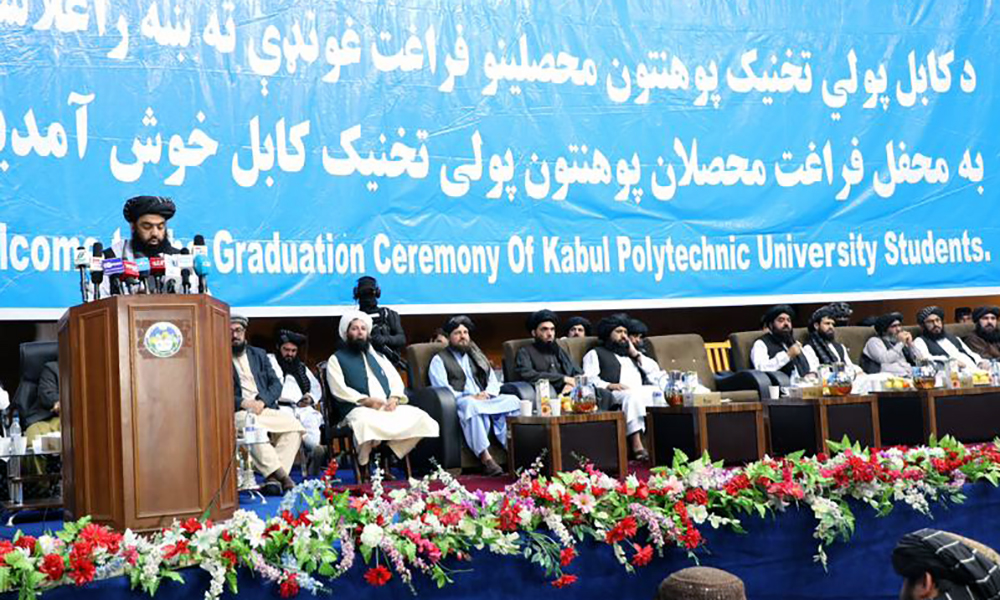
Mawlavi Abdul Kabir, the political deputy prime minister, said on Tuesday that the Islamic Emirate will not give in to international pressure and will not take orders from any country.
Speaking at the graduation ceremony of Kabul Polytechnic students, Kabir said that transit within the region is not possible without Afghanistan and that the government is working on the issue.
Kabir also said the Islamic Emirate of Afghanistan (IEA) is working on the implementation of projects and on developing the mining sector.
He also emphasized the need to provide conditions for the return of immigrants to the country.
The Islamic Emirate’s minister of Propagation of Virtue and Prevention of Vice, Mohammad Khalid Hanafi, also spoke at the event and said the IEA is not against the development of modern sciences in the country, but that Western countries are spreading negative propaganda against the Islamic Emirate.
Nada Mohammad Nadim, Acting Minister of Higher Education, also emphasized that the Islamic Emirate was victorious on the battlefield and will also win in the field of economy, health and education.
On the other hand, some officials of the Ministry of Higher Education said that the ministry is trying to make progress in the direction of scientific and educational expansion and to be equal to global standards.
Over 530 students graduated from seventeen departments of this university, and their graduation certificates were presented by the authorities of the Islamic Emirate.
Latest News
US shows greater willingness to engage with the IEA
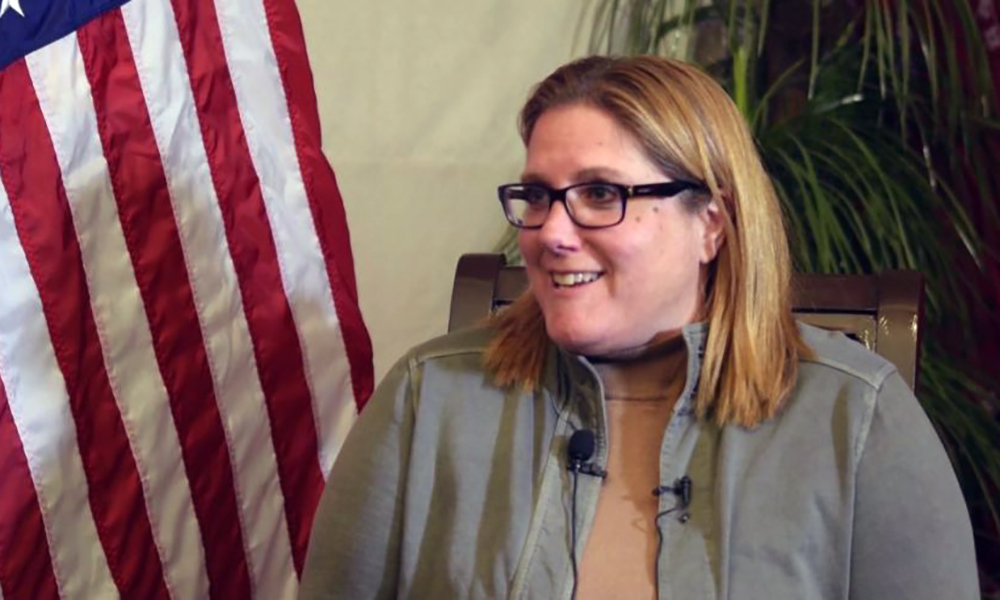
Washington is willing to move towards greater engagement with the Islamic Emirate of Afghanistan (IEA) as it seeks to tread a fine line between its human rights concerns and helping the Afghan people, interviews with top US officials and senior aid figures reveal.
Speaking to The New Humanitarian on the sidelines of a donor meeting in Istanbul last month, Karen Decker, chargé d’affaires of the US mission to Afghanistan, said Washington has “learned the hard way that isolation is ruinous. It’s ruinous for the Afghan people. It’s ruinous for the region”.
In the past year, the UN, several international and local NGOs, and Washington have all signaled that avoiding the Islamic Emirate won’t solve Afghanistan’s economic and humanitarian issues, The New Humanitarian reported.
This comes despite the IEA still refusing to allow girls and women to study beyond the sixth grade.
Decker told The New Humanitarian that Washington is now in a position where it must “very carefully navigate the non-recognition policy”, which requires a delicate balance of keeping in mind that the IEA took power by force rather than a democratic vote while still finding ways to reach the millions of Afghans who require emergency assistance.
One NGO source, who asked to remain anonymous, was quoted as saying by The New Humanitarian that “engagement [with the IEA] is necessary, but we have to find a way to balance engagement while not compromising on our principles.”
Decker agreed, saying Washington would continue to engage with the IEA on “pragmatic issues”, with humanitarian assistance and human rights being her primary areas of concern.
Because its non-recognition policy precludes US officials from working in the country, Washington has partnered with local and international groups on the ground to deliver assistance directly to the Afghan people.
But even with that cooperation, it’s not always so easy, as these groups must also tread carefully amid increasing IEA restrictions and regulations, The New Humanitarian reported.
Even though there is still a long way to go, particularly in terms of addressing US human rights concerns, Decker told The New Humanitarian she feels Washington’s efforts have led to some positive results.
“Eighteen months ago, we were worried about famine, and there is no famine in Afghanistan,” Decker said, crediting this largely to the work of local and international aid organizations.
However, she pointed out that Afghans still need more food assistance than in the past: “So, in some respects, you trade one problem for another.”
Decker raised another issue that adds to the difficulty of engaging further: the Islamic Emirate’s unwillingness to acknowledge any problems in the country: “They like to present Afghanistan as a success story… [and] they don’t want anyone thinking there’s anything wrong.”
She said if the Islamic Emirate were more straightforward to deal with, then humanitarian actors would save a lot of time and money and be able to reach those in need more quickly.
“We use a lot of time and effort making it work, because of the Taliban (IEA). They are fundamentally the challenge to making this work. We are able to navigate [it], but it would be much more efficient if the Taliban were much more [open].”
Decker did, however, give the Taliban some credit, saying they had shown some flexibility, especially in emergency situations.
She pointed to the Islamic Emirate’s responses to a series of earthquakes that rocked the western province of Herat, and the recent mass expulsions of hundreds of thousands of Afghans from neighboring Pakistan, as examples of when the IEA saw it necessary to amend or loosen some of their restrictions, The New Humanitarian reported.
“Women were suddenly allowed to work because they had to reach women beneficiaries,” she said.
While engagement efforts have sparked widespread criticism, all the sources The New Humanitarian spoke to said they saw little benefit in pretending the Islamic Emirate does not exist.
With an “overwhelming need in the country”, simply ignoring the IEA will do nothing to improve the lives of the millions of Afghans who remain in need, said Decker.
“It’s not in anyone’s interest for us to isolate the country,” she added. “And I say this over and over: I feel strongly that if the United States does not advocate for the Afghan people, nobody will. So, I don’t need any more motivation than that.”
The New Humanitarian reached out to the Islamic Emirate’s Ministry of Foreign Affairs for comment on several matters related to the issue of engagement, but it failed to respond.
Decker and other sources did however, express some hope based on private meetings and the public statements of several high-ranking Islamic Emirate officials, who have acknowledged that all girls and women should be allowed to return to school and that the government must expand beyond just the IEA.
“We know that there [are] senior Taliban leaders who have their daughters in school outside of the country, and some of them have even been open in their own statements about the importance of education,” said Decker.
However, for progress to be made towards US recognition, she said the Islamic Emirate must officially change some of its policies, pointing to increased work opportunities for women and real inclusion of non-IEA members in the government as concrete examples of possible game-changers.
-

 Sport5 days ago
Sport5 days agoAfghanistan beat Iraq 5-3, inch closer to Futsal World Cup berth
-

 Latest News4 days ago
Latest News4 days agoPakistan extends registered Afghan refugees’ stay till June 30
-

 Regional4 days ago
Regional4 days agoChina to host Hamas, Fatah for Palestinian unity talks
-

 Sport3 days ago
Sport3 days agoAfghanistan qualify for FIFA Futsal World Cup for first time ever
-

 Latest News5 days ago
Latest News5 days agoTripartite trade meeting held in Kabul to boost regional connectivity
-

 World5 days ago
World5 days agoIn Beijing, Blinken meets Xi and raises US concerns about China’s support for Russia
-
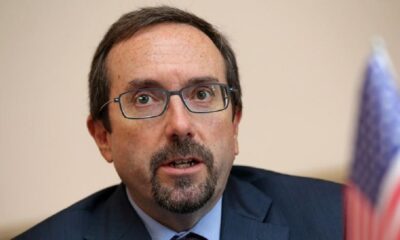
 Latest News4 days ago
Latest News4 days agoUS diplomat Bass travels to Qatar and Pakistan to discuss Afghanistan, regional issues
-

 Sport4 days ago
Sport4 days agoAsia must believe Afghanistan’s power in futsal: Mortezaei















